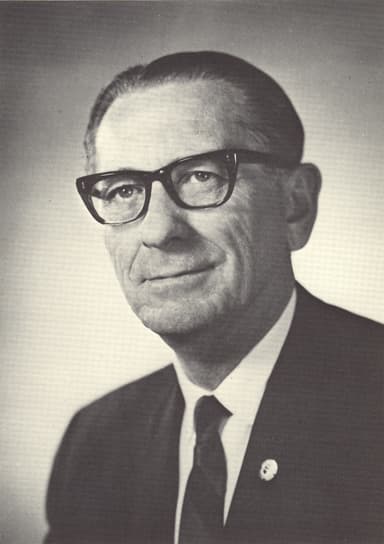
The year 1968 was one of turmoil for the nation. The assassination of Martin Luther King sparked riots in major cities. The Democratic convention riots coupled with Vietnam and the killing of Robert Kennedy bred feelings of discontent, frustration, and helplessness.
With an insightful and sensitive eye on the nation’s happenings, Lyn E. Davis* used his term as NAR president to launch the “Make America Better” program, which addressed the concerns of jobs, education, and housing.
“Housing cannot be solved unless other problems intertwined with it are attached simultaneously and solutions are found,” he said. The urban ills he challenged with the program were juvenile delinquency, law enforcement, restrictive building practices, the marketing of housing on a non-discriminatory basis while preserving the freedom of contract, the training of families in protection, and the encouragement of rehabilitation.
“This involves more than a ‘pet project,’” he said. “It is a challenge to help less fortunate families move up the ladder to a better scale of living.”
Mr. Davis considered the formation of the Real Estate Political Education Committee (REPEC) to be one of his greatest achievements as president. The purpose of REPEC, the forerunner of the REALTORS® Political Action Committee (RPAC), was to further the interests and stature of the real estate industry by accepting and disbursing political campaign contributions from members to elected officials. With the 1968 formation, Mr. Davis aimed at the 1970 election, calculating that by then the committee would be in efficient and effective working order.
Davis led the fight against what he termed “punitive measures” in the fair housing section (Title VIII) of the 1968 Civil Rights Act. But after losing the battle, he called on all REALTORS® to learn and live with the laws. He called on Congress to relieve the plight of the disadvantaged in their housing needs. Such relief came in a three-year, $5.5 billion housing bill designed to help lower-income families become homeowners. Two major NAR-backed amendments to the bill established income ceilings for families receiving federal home ownership subsidies or low-rent apartment assistance, and transferred the Federal National Mortgage Association (Fannie Mae) to full private ownership. Davis was one of a select group invited by President Lyndon Johnson to witness the signing of the bill in Washington.
Mr. Davis was selected REALTOR® of the Year for Dallas in 1955, and in 1960 received the same award from the state of Texas. He was a founding director of Republic Savings & Loan Association and also a director of Greenville Avenue Bank & Trust, both in Dallas.
At the close of his year in office, Mr. Davis predicted that the nation must overcome four major obstacles to meet the housing demands of the next 10 years. Those obstacles, he cited, were old-fashioned approaches to financing, outdated building codes, the limited supply and high cost of skilled labor in the building trades, and the lag in technological advances in construction.
Source: Presidents of the National Association of REALTORS®, (Chicago: NAR, 1980).
*Deceased








